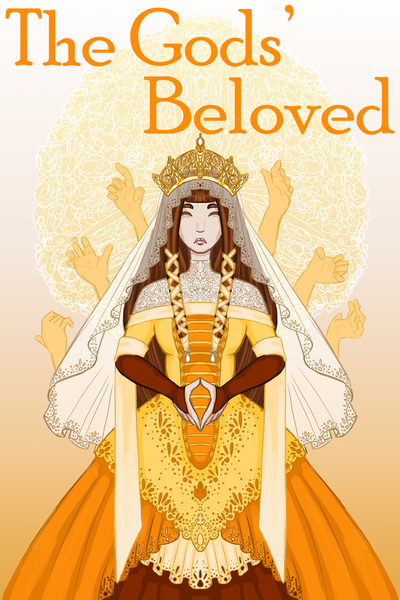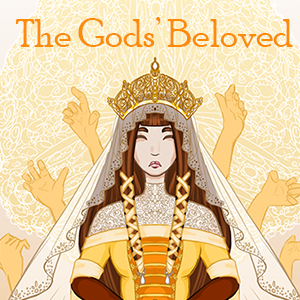An old woman blocked our path. She’d clearly been waiting for us along the road and had shuffled into the middle of the highway as we approached. Sir Carid approached her alone, his face set in a severe frown. The rest of the soldiers clustered close to the carriage on their horses at his order. He had reason to be suspicious. We were traveling fast enough that word shouldn’t be outpacing our progress. Yet somehow, an old village woman had known we were coming. I strained to hear what was being said, but both of them were soft-spoken and I couldn’t pick anything up over the rattle of armor and snort of the horses.
Then Sir Carid returned to the carriage and I opened the window to hear what he’d learned.
“She says she’s been waiting here every day since the ships were sunk at Manere,” he said. “She figured the Beloved would be bound to pass by eventually.”
It would be alarming that literally anyone could figure out my route if it weren’t utter insanity to try harming the Beloved. It would earn the anger of every single god in the kingdom. They’d have nowhere to run to. Manere’s god was the only one we couldn’t be certain of, hence Sir Carid’s presence.
“So what’s their problem?” I asked.
“Their god is dead.”
Dead. Gone. It wasn’t really the same thing, but sometimes these smaller settlements didn’t make the distinction. Gods got tired of being part of this world at some point and simply… left. I suppose the philosophers could make a case for vanishing and dying being the same thing, but we didn’t like to call it that. It wasn’t good for us if other kingdoms believed our gods could die.
“I am not getting involved with anointing a new god,” I snapped. “I draw the line there. I have enough nightmares already about my own ascension.”
Sir Carid grimaced and looked away. It did tend to make people uncomfortable when I reminded them of how violent the ritual was, but that wasn’t about to stop me. They could be uncomfortable. I was the one that had been stabbed.
“I don’t think that’s what she’s asking,” he said. “She wants to know who killed him.”
“You can’t kill a god,” I replied snidely. “Politely send her along and let’s keep going.”
I was in a foul mood from being in a carriage all day. My new maid was a decent conversationalist, but it turns out that like reading, there’s only so much talking I could tolerate. Sir Carid, however, wasn’t deterred.
“It was her son,” he said. “They sacrificed her son. He’d only been a god for five years.”
That made me pause. A god’s reign averaged eighty years. Five was unheard of. I wasn’t as diligent in my study of the temple’s history as the priests would like, but I didn’t recall ever hearing of a tenure that short.
“Fine,” I sighed. “Let’s go take a look at their temple. I’ll wager you that it’s a barn.”
“Be polite,” Sir Carid murmured as he opened the door to my carriage.
“Oh I am good at faking politeness,” I replied under my breath. “It’s about all I’m good at.”
Then I plastered a smile on my face and went to greet the old woman.
The temple was, in fact, a barn. The village was big enough that it could give their god that much. There seemed to be a hierarchy to these things. The smallest of settlements had sacred groves, then barns, and then finally an actual house. It all came down to what they could spare.
I’d expected us to go inside, look around, and then leave. But that had all come crashing down as soon as we entered. The old woman had gone to a lump in the middle of the floor and ripped away the sheet that covered it.
A body lay on the ground. A young man. His eyes were covered with a blindfold. His clothing was covered in dried blood, originating from a hole in the middle of his abdomen.
“He was run through,” Sir Carid said softly from my side. “Someone killed him with a sword.”
I had no reply. I just stood dumbly in the middle of the dirt floor while Sir Carid’s knights milled about, inspecting every corner. There was a fair bit of clutter in the barn. Likely they used it as storage as well as the god’s temple. Lucky for them that the gods tended not to care about their accommodations. It was a mortal conceit to lavish them with riches.
“Beloved Alyere,” Sir Carid said respectfully, approaching me, “Come this way.”
He led me outside and away from the others. We walked a short distance from the barn and then he pointed at the ground. I stared at it stupidly, unsure of what I was supposed to notice.
“There’s hoofprints,” he finally said, stooping to shift the grass aside. “Likely made while the ground was wet, which preserved them. They’re old, but not so old that they’ve been worn away yet. I think they fall within the timeline of when the god died.”
“Someone killed a god,” I whispered. “Someone did this intentionally.”
“My people are loyal,” he said. “I’m ordering them to speak of this to no one, not even among themselves. We’ll finish up our business with Manere as quickly as possible and return to the capital.”
He didn’t trust this to messengers. We would inform the queen ourselves. We returned to the barn and he quickly issued orders to everyone. The knights were to burn the body. It was not decomposing, despite how long it had laid there uncovered, so it had to be gotten rid of by other means. Then Sir Carid told the old woman to keep all of this quiet. Hopefully the village’s fear would keep them from gossiping. He promised to send priests to help them sort this out and find answers for them.
And possibly put a knife into the heart of their next god. I shivered in the warm sunlight, anxious to be away from here.
A murdered god. It seemed that my hopes for a quiet and peaceful life were going to be forever out of reach.











Comments (0)
See all